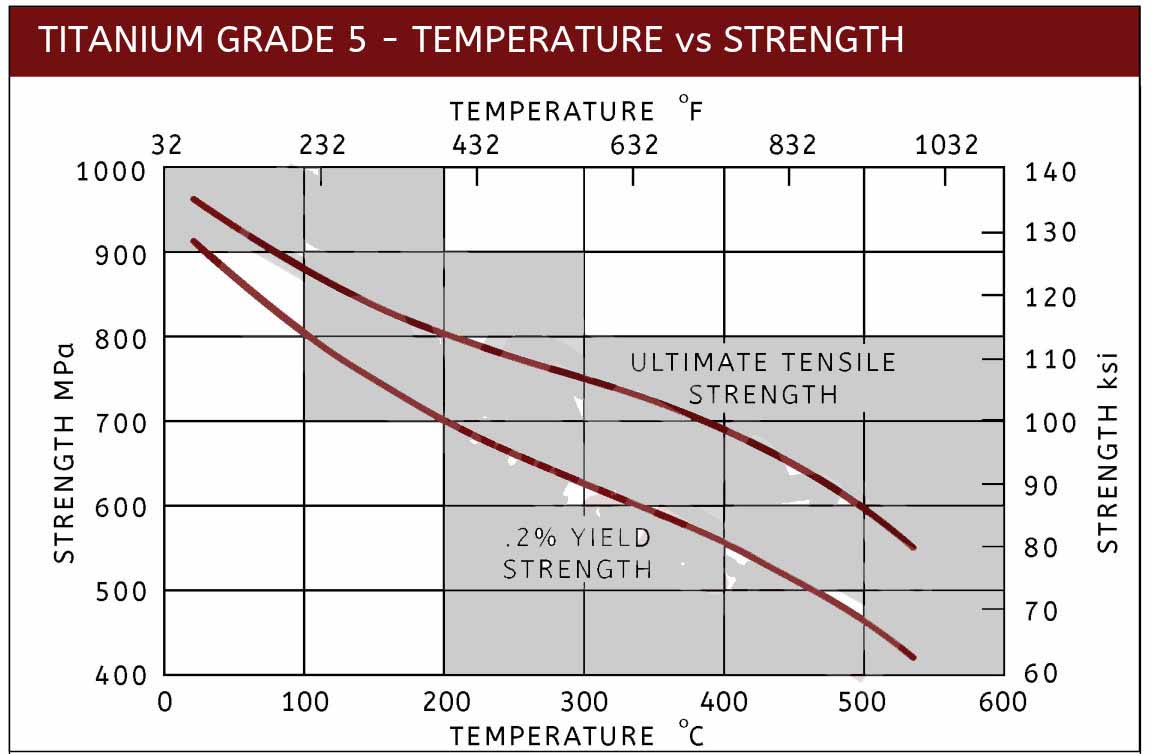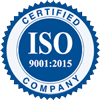Titanium Shoulder Bolts
Unique for its strength, lightness of weight and corrosion resistance
- Lightweight and high strength

- Corrosion resistant to chlorides, sea water & chlorine
- Excellent mechanical properties
- Titanium grades, chemistry & specifications
- Titanium shoulder bolt features and benefits
- Temperature vs. strength data
- In-dept information on Grade 2 and Grade 5
Titanium shoulder bolts are best known for being strong, lightweight and corrosion resistant. One property that stands out when compared to other metal bolts is that titanium bolts have the highest strength-to-weight ratio with a density of 4.51 g /cm3. As an example, titanium grade 5 is 4 times stronger than 316 stainless steel at nearly half the weight. This makes titanium shoulder bolts ideal for applications that require both lightness of weight and excellent strength such as oil & gas (down-hole), military and sporting goods.
Titanium bolts are also unique among metals in the chemical processing industry for handling chlorine (wet) and chlorine compounds in aqueous solutions. Titanium shoulder bolts are fully resistant to solutions of chlorides, hypochlorites, chlorates, perchlorates and chlorine dioxide. As a result titanium bolts are often using within the chlorine related industries such as pulp and paper and chlor-alkali / bleach.
Titanium shoulder bolts are also an excellent material to prevent seawater corrosion. Because titanium bolts can resists corrosion by seawater up to temperatures as high as 500°F (260°C) as well as survive at ocean depths over a mile below the surface, titanium bolts are used throughout the oil & gas, desalination and marine industries.
The most common grades of Titanium shoulder bolts are Grade 2 and Grade 5. Gain more insight on these by accessing our Grade 2 and Grade 5 overviews or by contacting our engineering experts.
Resources: Titanium Torque Specs
Bolt Types Available: Hex Bolts, Shoulder Bolts
Titanium Shoulder Bolt Features and Benefits
Titanium shoulder bolts, also called stripper bolts are a unique fastener with three main parts: head, shoulder, and thread. The head has the largest diameter and is where the torque is applied, typically with a socket driver. The shoulder is smooth and unthreaded, and has a set diameter and length. The shoulder’s role is to act as a shaft or dowel for rotating parts, axles for rolling parts, guides for sliding elements, and pivot points. The final part of a titanium shoulder bolt is the threaded shaft. The threaded portion of a shoulder bolt has a major diameter slightly smaller than the shoulder diameter.
Titanium Grades, Chemistry & Specifications
Titanium Grade 2 (Commercially Pure)
Unalloyed titanium; Commercially pure titanium is the most common grade of titanium utilized throughout industry due to its ease of availability and good properties.
Titanium Grade 2 Specifications: UNS R50400, ASTM B 348, AMS 4921, ASTM F 67, ISO 5832-2, Werkstoff 3.7035

Titanium Grade 5 (Ti 6Al-4V)
Known as the “workhorse” of the titanium alloys, Ti 6Al-4V, or Grade 5 titanium, is 2x stronger than titanium grade 2. This alloy offers high strength and light weight, useful formability and high corrosion resistance. Ti 6AI-4V finds many uses in the aerospace, medical, marine and chemical processing industries.
Titanium Grade 5 Specifications: ASTM - B265, B348, B381, B861, F467 and F468, AMS - 4911, 4928, 4935, 4965 and 4967, MIL-T - 9046 and - 9047, Werkstoff 3.7165

Titanium Grade 7
Grade 7 is the most corrosion resistant of all titanium alloys and is typically used in chemical processes and production equipment components. Similar to Grade 2, but with the addition of 0.12 to 0.25% palladium, Grade 23 has enhanced corrosion resistance to reducing acids and localized attack in hot halides.
Titanium Grade 7 Specifications: ASTM - B265, B337, B338, B348, B363, B381, B861 and B862, Werkstoff 3.7235

Titanium Grade 23 (TI 6AL-4V ELI)
Titanium grade 23 or TI 6AL-4V ELI is an Extra Low Intersticial grade. This grade is similar to Grade 5, but because of the low intersticials, its mechanical properties are enhanced. This ELI grade is often found in more demanding medical device applications as well as industrial applications.
Titanium Grade 23 Specifications:
ASTM - B265, B348, B363, B381, B861, B862 andF136, AMS - 4907, 4930 and 4956

Other titanium grades are also available upon request.
Mechanical Properties
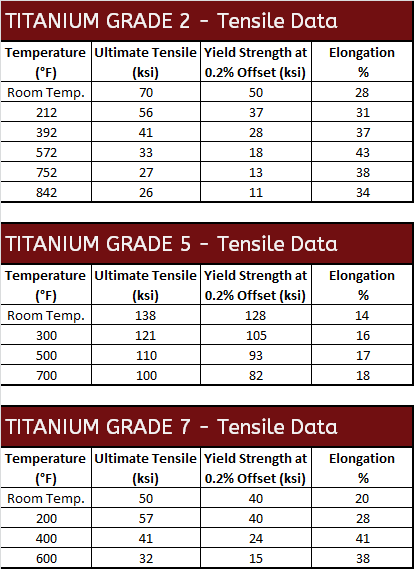
Titanium's Resistance to Chlorine
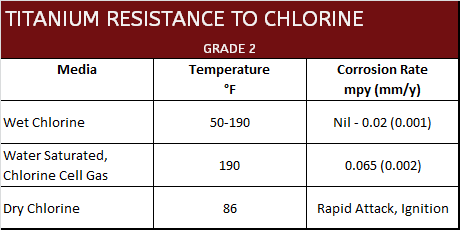
Corrosion Data
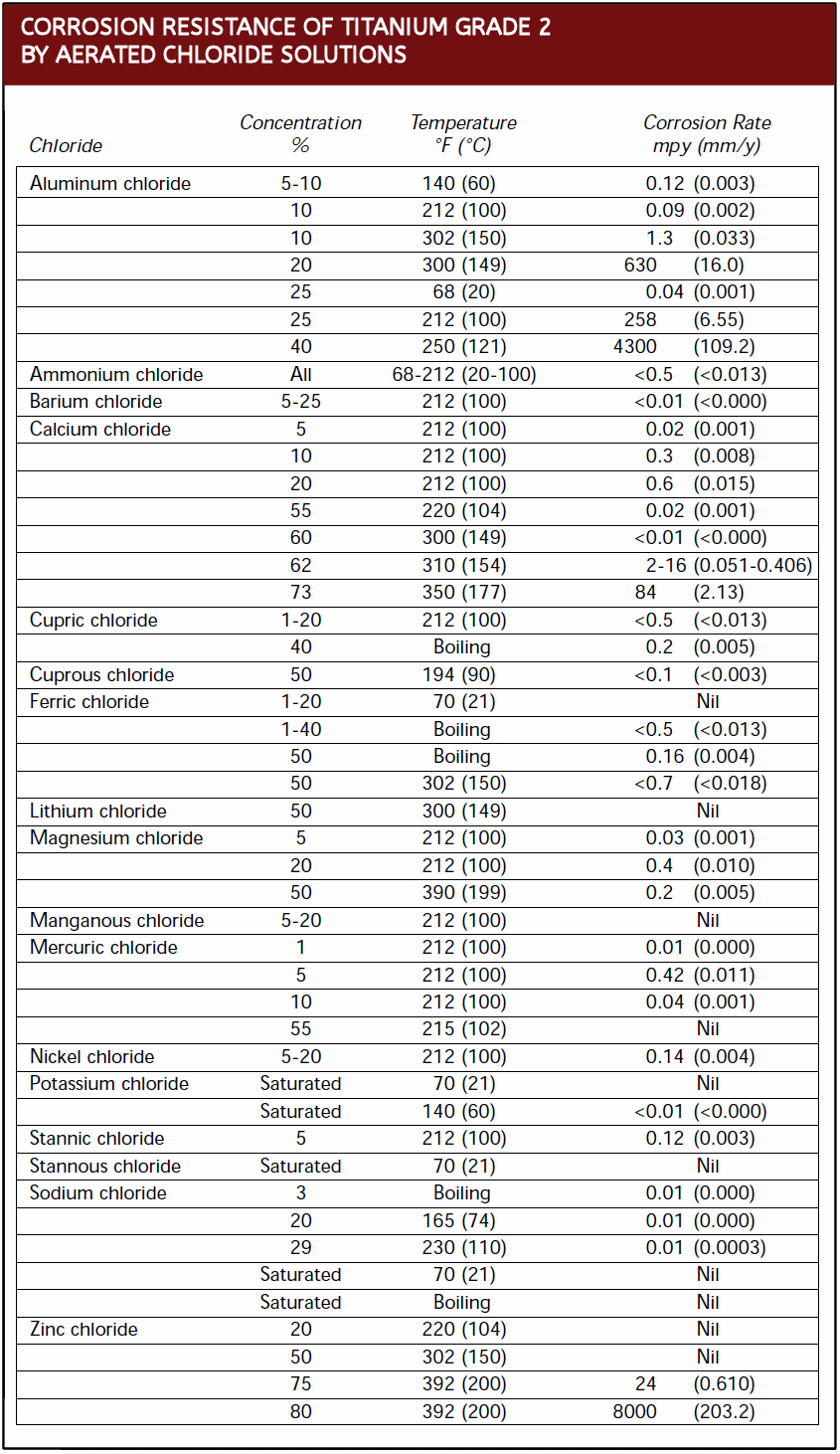
Titanium Grade 5 Temperature vs. Strength
